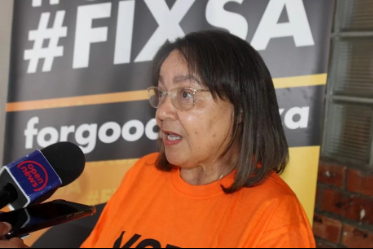
Registering as a member of Parliament after a 10-year absence filled me, on the one hand, with a warm sense of familiarity and nostalgia, and, on the other, a feeling of sadness that we have not made more progress on the journey we embarked on to heal South Africa in 1994.
Although Parliament is the platform for a battle of ideas by representatives of competing political parties, I don’t believe that it is the level of contestation that should define us.
What should define us is our contribution to the parliamentary institution fulfilling the role it should in our democracy.
One of the strongest messages I picked up on the campaign trail across the country – from young and old, rich and poor, black and white – was that people are losing, or have already lost, belief in their public representatives.
They say they are tired of watching politicians hammer away at each other in Parliament, and feel this is negatively affecting government’s ability to deliver services.
Parliamentarians, particularly members of opposition parties, have an important role to play in holding the governing party to account.
But holding those who wield power to account entails more complex strategies than either the constant criticism or constant interruption of debates we have witnessed over the past 10 years.
On her mantelpiece at home, Mam’ Leah Tutu has placed a bumper sticker stating: “Everyone is entitled to their wrong opinion!” Her husband often reminds people of an expression his father used: “Don’t raise your voice; improve your argument.”
Of course, both are right – and both should apply to parliamentarians.
While stating disdain for the governing party in a variety of “clever” ways may make for great television, it is actually a cop-out because it does nothing to unblock blockages or advance people’s understanding of alternative policies and solutions.
Towards the end of my first term in Parliament, I was able to blow the whistle on corruption in the multibillion-rand arms deal not because I shouted the loudest, but because I developed relationships of trust with a number of my parliamentary colleagues and state officials.
It is a severe blot on Parliament’s record – members of the governing and opposition parties included – that it has not been able to use its institutional muscle to ensure legal closure on those matters for more than 20 years.
After resigning, I served briefly as an MEC before being appointed as the mayor of Cape Town.
While my relationship with the DA soured over transformation in general and spatial transformation in particular, I am very grateful for the insights received during my time at the helm of the city.
I gained critical knowledge of the practical side of governance – for example of the Municipal Finance Management Act – to the point of obtaining an unprecedented four clean audits in a row.
Having already served as a trade unionist, an anti-apartheid cadre, an MP and an MEC, it felt as though working in local government completed the full house.
More importantly, it gave me an acute understanding of cities’ roles in the greater scheme of things; in the context of a rapidly urbanising population, creaking infrastructure and increasing urgency to contribute to decelerating the climate crisis.
Cities not only accommodate masses of people, they also generate a disproportionate amount of a nation’s destructive pollutants.
During my term as mayor, the Western Cape endured a drought unprecedented in living memory. At the same time, residents found themselves besieged by a failing Eskom.
Cities must be given greater autonomy and responsibility to manage resources, including water and electricity.
It is very pleasing to note that one of the initiatives we undertook – to obtain a court order permitting the city to buy electricity directly from independent power producers – is on the Pretoria High Court’s roll next month.
When we established the Good movement a few months before the elections, we assembled a small team of sensible people to conduct research and develop a set of sensible policy positions around the theme of justice.
The result was an election manifesto based on four legs: social, economic, environmental and spatial.
Among the most appalling lingering aftertastes of apartheid is the Group Areas Act.
The general pattern is that relatively affluent (mostly white) people live closest to work places, while people of colour live a little further away.
In Cape Town, conservatives in the DA managed to find every excuse under the sun to block the development of well-positioned land for social housing.
Instead, they said, there was no “suitable” land. Suitable land is rather sold to private developers for lots of money.
This isn’t just a problem in Cape Town. It’s a South African city and town problem.
Poorer people are accommodated further and further away from economic hubs, and those fortunate enough to be employed spend a large part of their meagre pay packets on transport.
Looking around me at my fellow parliamentarians registering for service, I was proud to see how many women there were.
They must do more than make up numbers; they must rise to the top. Wherever you go in South Africa, women bear disproportionate burdens compared to men.
They earn less, if they have a job, but often bear all the costs of raising children.
We have various women’s organisations, women’s leagues – even a department of women – but the face of poverty is nevertheless irrefutably that of a woman of colour.
Men haven’t done a fantastic job leading South Africa or the world … It is my prayer that the era of parliamentary testosterone from which we’ve just emerged is consigned to history in favour of real debate and real progress.
. De Lille is the leader of Good




 Publications
Publications
 Partners
Partners








